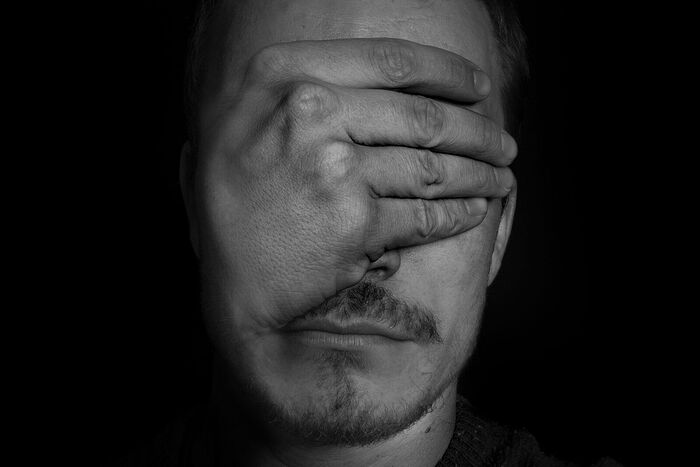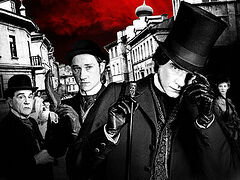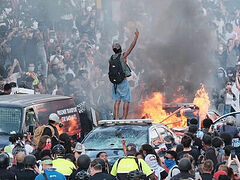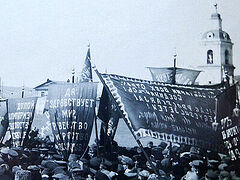The blindness of the spiritual eyes, and Christ—the Source of light Who enlightens the eyes of the heart (cf. Eph. 1:18)—this is what the holy Church wants to remind us of, brethren, on this present feast.
How few are inclined to confess that spiritual darkness has clouded their spiritual eyes, at least in part. Of course, most people, together with the leaders of the Jewish people who were denounced by Christ, are more inclined to ask: Are we blind also? (Jn. 9:40). And as the leaders of the Jewish people, instead of seeking enlightenment from Christ, “the Light of the world,” the Healer of human infirmities and ailments (Jn. 9:4-5, Mt. 8:16-17, 12:15-23), sent into the world by God, they’re guided not even by the Law given by God, which spoke of Christ (Jn. 5:46), but by the traditions of men (Mt. 15:3-9). And even now, are not many modern leaders of mankind, who likened to these blind leaders of the blind (Mt. 15:14), drawing wisdom not from the Gospel of Christ, but from philosophy after the tradition of men, after the rudiments of the world, and not after Christ (Col. 2:8), by the sleight of men, and cunning craftiness (Eph. 4:14), or from the study of the so-called “exact” sciences, just as blind and unable without Christ to penetrate into the essence of things as was the Gospel blind man, who perceived things not with his eyes, but only felt them in the dark, stumbling as he went?
And so the spiritual mist, the “cloud of the heathen,”1 more and more envelops the minds of men, even those who bear the name of Christ. Many of them ever more fail to distinguish good from evil, and call evil good, and good evil; [and] put darkness for light, and light for darkness (Is. 5:20).
What, for example, do Christ, Who, like a lamb who openeth not his mouth (Is. 53:7), endured innocent sufferings, and modern revolutionaries, whose activities are unthinkable without deadly violence have in common? What do Christ, Who in the desert rejected the temptation to draw mankind to Himself by bread (Mt. 4:3), Christ, Who withdrew from the people into the desert when they wanted to make Him King after getting their fill of bread (Jn. 6:5-15), and modern socialism, which wants to establish the kingdom of universal satiety as the basis of the welfare of mankind have in common? And, however, following the Jews who crucified Christ, they want to present Him as a revolutionary and socialist on the sole basis that the light of Christ’s teachings taken by the socialists and revolutionaries into their systems make it possible to present the darkness of their teachings as light in the eyes of the people (2 Cor. 1:13-15). How obscured the understanding of the true meaning of Christianity has become in the eyes of the people!
Or what dirt wasn’t swept into a single pile under the name of the notorious “liberation movement!” How the high concept of freedom has been obscured! Apparently, those called unto liberty must serve one another (Gal. 5:13), but instead of the true love of Christ, by which the first Christians could indeed be known as true disciples of Christ (Jn. 13:35), do we not see a return of society to those vices that, according to the imagery of the holy Apostle Paul, were inherent in pagan society before the first coming of Christ into the world. They, says the Apostle, are filled with all unrighteousness, fornication, wickedness, covetousness, maliciousness; full of envy, murder, debate, deceit, malignity; whisperers, Backbiters, haters of God, despiteful… Who knowing the judgment of God, that they which commit such things are worthy of death, not only do the same, but have pleasure in them that do them (Rom. 1:29-32).
How much deceit, lying, and hypocrisy there is in many of those who have arrogated to themselves the title of honest freedom fighters! Have they not “shed blood like water,” which now cries out to God against them (cf. Ps. 78:3; Gen. 4:10)? Haven’t they, while calling the blood of their supporters “holy blood,” refused to condemn the murder of those who didn’t want to follow them, and when the blood of innocent woman and children or people who were convicted to fulfill their duty to the fatherland was shed, did they not say: “You can’t make an omelet without breaking some eggs?” Have they not disgraced the virtue of love for the fatherland, making it terrible just to speak about this love, classifying all those who declare it as bloodthirsty thugs? Would they dare to count among the latter those holy hierarchs who contributed to the rise of the state power of the Russian land, defending it from foreigners, such as Sts. Peter, Alexei, Germogen, and others?
But when you tell them that all peoples are characterized by love for their fatherland, they start declaring that they reject only false love for the fatherland, that they love it with a true, higher love. Perhaps we could believe them if they could present evidence of such love. But where is this evidence? Are these not just supposedly high words mixed mostly with lies and slander? Is it not the complete neglect of Russian soldiers who fell on the fields of Manchuria and in ocean waters, who are denied even the final consolation of their posthumous prayer; and of the war heroes who returned crippled and their families, but with some touching concern for the criminals sitting in prison, most of whom receive the due reward of [their] deeds (Lk. 23:41)? Let us recall that some saw a manifestation of love for the fatherland in the fact that they desired that it suffer defeat from the Japanese; contributed in every way to this defeat with their instructions and advice; sold Russia for money to enemies; flooded the troops with outrageous proclamations; staged general strikes and uprisings; tried in every way possible to shatter the government’s power; and finally, had designs on the life of the Sovereign himself.
Is there anywhere outside of Russia that would consider this to be love for the fatherland in the true, highest sense of the word, rather than treason?
If someone doesn’t even have love for his homeland, so characteristic of man, can he consider himself to be at a high stage of spiritual development? Are not the words of the holy Apostle applicable to him: But if any provide not for his own, and specially for those of his own house, he hath denied the faith, and is worse than an infidel (1 Tim. 5:8)? Do not the thick darkness of evil and murk of the passions cover the spiritual eyes of those who don’t realize how cruel it is torment their mother who is suffering hardships and illness, their homeland that brought them up?
May the Russian people turn with a sincere heart to Christ, the Source of light by Whom they were enlightened long ago, receiving Christ into their very being; and may they never leave the enclosure of Christ under the influence of false leaders who don’t have the light of Christ within them; so that “other sheep” from another pasture wouldn’t be called instead of them (Jn. 10:16), but that the words of the Prophet Isaiah would be fulfilled in them: Arise, shine [Jerusalem]; for thy light is come, and the glory of the Lord is risen upon thee. For, behold, the darkness shall cover the earth, and gross darkness the people: but the Lord shall arise upon thee, and His glory shall be seen upon thee (Is. 60:1-2).
Amen.




